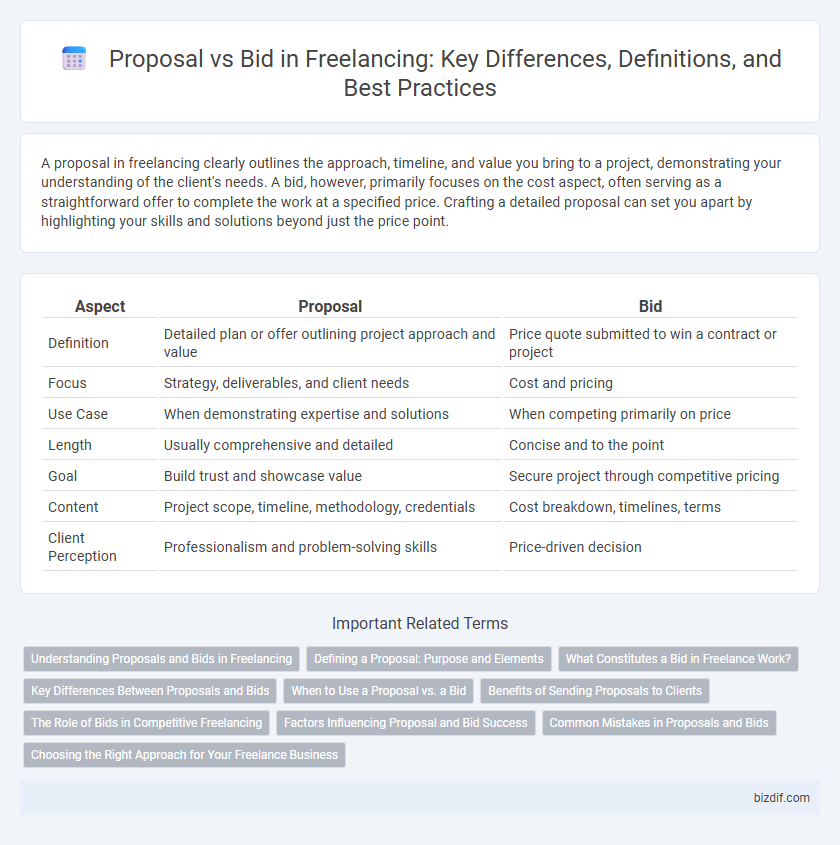A proposal in freelancing clearly outlines the approach, timeline, and value you bring to a project, demonstrating your understanding of the client's needs. A bid, however, primarily focuses on the cost aspect, often serving as a straightforward offer to complete the work at a specified price. Crafting a detailed proposal can set you apart by highlighting your skills and solutions beyond just the price point.
Table of Comparison
| Aspect | Proposal | Bid |
|---|---|---|
| Definition | Detailed plan or offer outlining project approach and value | Price quote submitted to win a contract or project |
| Focus | Strategy, deliverables, and client needs | Cost and pricing |
| Use Case | When demonstrating expertise and solutions | When competing primarily on price |
| Length | Usually comprehensive and detailed | Concise and to the point |
| Goal | Build trust and showcase value | Secure project through competitive pricing |
| Content | Project scope, timeline, methodology, credentials | Cost breakdown, timelines, terms |
| Client Perception | Professionalism and problem-solving skills | Price-driven decision |
Understanding Proposals and Bids in Freelancing
Proposals in freelancing are detailed documents that outline a freelancer's approach, skills, and solutions tailored to a client's project requirements, emphasizing value and expertise. Bids focus primarily on pricing, presenting a financial offer to complete the project within a specified budget. Understanding the distinction between proposals and bids helps freelancers craft compelling offers that balance quality, scope, and cost to win competitive contracts.
Defining a Proposal: Purpose and Elements
A proposal in freelancing serves as a detailed document outlining the freelancer's approach to a project, designed to persuade clients by addressing specific needs and deliverables. Key elements include a clear project understanding, scope of work, timeline, pricing, and the freelancer's qualifications or experience relevant to the task. Crafting a well-structured proposal enhances clarity, builds client trust, and increases the chances of project approval.
What Constitutes a Bid in Freelance Work?
A bid in freelance work is a formal offer submitted by a freelancer outlining the price, timeline, and scope to complete a project, often in response to a client's request. It includes detailed breakdowns of costs, deliverables, and any conditions or milestones associated with the job. Bids serve as a competitive method for clients to compare various freelancers' terms before awarding the contract.
Key Differences Between Proposals and Bids
Proposals in freelancing highlight tailored solutions, project understanding, and value addition, while bids emphasize pricing and cost estimates. Proposals often include detailed work plans, timelines, and deliverables, showcasing expertise and approach; bids primarily focus on competitive pricing to secure contracts. The key difference lies in proposals aiming to persuade through quality and strategy, whereas bids prioritize winning contracts through price quotations.
When to Use a Proposal vs. a Bid
Use a proposal when offering a detailed plan or solution tailored to a client's specific needs, highlighting your expertise and approach. A bid is more appropriate for projects with clear specifications and a fixed budget, where the main factor is the price or cost estimate. Choosing between a proposal and a bid depends on project complexity, client expectations, and whether customization or competitive pricing is prioritized.
Benefits of Sending Proposals to Clients
Sending tailored proposals to clients demonstrates professionalism and a clear understanding of project requirements, increasing the likelihood of winning freelance projects. Proposals allow freelancers to outline their unique skills, project approach, and value proposition, creating a personalized connection that generic bids often lack. Detailed proposals improve client trust and showcase commitment, often resulting in higher-quality projects and long-term collaborations.
The Role of Bids in Competitive Freelancing
Bids play a crucial role in competitive freelancing by allowing freelancers to present their pricing strategies and project scope to potential clients. Effective bids differentiate candidates through clear value propositions and detailed cost breakdowns that align with client budgets. Understanding market rates and tailoring bids to specific project requirements enhance the chances of winning contracts in a competitive marketplace.
Factors Influencing Proposal and Bid Success
Freelancing proposal and bid success depends on factors such as project relevance, client requirements, and freelancer expertise. Crafting a personalized, detailed proposal that addresses specific client needs increases win rates, while competitive pricing and clear deliverables enhance bid attractiveness. Strong communication skills and proven portfolio credibility further influence client trust and project approval.
Common Mistakes in Proposals and Bids
Common mistakes in freelancing proposals and bids include submitting generic, non-tailored content that fails to address the client's specific needs, leading to reduced project appeal. Overpricing or underpricing due to lack of market research damages credibility and competitiveness. Ignoring clear communication, detailed scope, and relevant experience often results in missed opportunities and lost contracts.
Choosing the Right Approach for Your Freelance Business
Selecting the right strategy between submitting a proposal or placing a bid significantly impacts the success of your freelance business. Proposals allow for detailed customization of services and demonstrate your unique value, ideal for complex projects requiring tailored solutions. Bids work best for clearly defined tasks with set budgets, providing a straightforward, competitive price advantage to win clients quickly.
Proposal vs Bid Infographic

 bizdif.com
bizdif.com